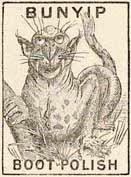NOT ALL the notes arriving at the Billabong are penned in vitriol’s ink, and the alert that arrived this morning from “Bob on the Murray” is one of those. “Have you seen Crikey?” he wonders, going on to note that Guy Rundle has done to George Orwell what so many others have found irresistible: conscript him posthumously to various and often contradictory causes. Conservatives, hard-to-port lefties, environmentalists – all are a bit too fond of grinding Orwell’s bones to make their bread. As Brit left-leaner Alistair Harper observed last year in Prospect magazine, “Crudely put, George Orwell is anyone’s bitch.”
Now Rundle has appointed himself Orwell’s latest butch cellmate:
The Australian’s war against Manning Clark had a final twist this week when Fairfaxista Gerard Henderson weighed in, to remind readers that among the million-plus words Clark published, he once remarked that Lenin had a “Christ-like visage”, and that appears sufficient to damn his reputation. This pathetic snippeting represents the sad decline — from debate to culture war — that makes genuine intellectual life impossible. What, for example, would the Henderson kid make of this quote:“I have to put it on record that I have never been able to dislike Hitler … that Christ-like face, so full of suffering.”The speaker is neither Oswald Mosley nor even Sir Robert Menzies, but George Orwell (Collected Journalism Vol 3, item 1). Even more amazingly it was from a review of Mein Kampf, published — near incredibly — the day Britain declared war on Germany.
As a former winner of The Age Non-Fiction Book of the Year award you expect Rundle to get a few things wrong, but the above attempt at literary necrophilia is a genuine shocker. Start with a glaring error of fact: The Mein Kampf review was not published on “near incredibly -- the day Britain declared war” or even, near incredibly, in the same year. That conflict officially began on September 3, 1939, two days after Hitler invaded Poland, and not, as Rundle believes, on March 21, 1940, when the edition of New English Weekly which carried the review reached newsagents.
As to the review itself, you would not get the gist of Orwell’s thoughts from Rundle’s snatch quote, which is nothing less than the slandering by abridgement of a man who copped a bullet in the throat while fighting fascists in Spain. Yes, Orwell did write of being unable to “dislike Hitler”, but that was not all he had to say. Here is the full quote, the one Rundle bowdlerised in the interests of making his dishonest point:
I should like to put it on record that I have never been able to dislike Hitler. Ever since he came to power — till then, like nearly everyone, I had been deceived into thinking that he did not matter — I have reflected that I would certainly kill him if I could get within reach of him, but that I could feel no personal animosity.
Rundle deploys ellipses – that same “pathetic snippeting" he decries in Henderson -- to conceal Orwell’s meaning. So here for the record are the words he found it expedient to flush down the memory hole, as the man whose memory he is smearing put it in 1984:
The fact is that there is something deeply appealing about him. One feels it again when one sees his photographs — and I recommend especially the photograph at the beginning of Hurst and Blackett’s edition, which shows Hitler in his early Brownshirt days. It is a pathetic, dog-like face, the face of a man suffering under intolerable wrongs. In a rather more manly way it reproduces the expression of innumerable pictures of Christ crucified, and there is little doubt that that is how Hitler sees himself. The initial personal cause of his grievance against the universe can only be guessed at; but at any rate the grievance is there. He is the martyr, the victim. Prometheus chained to the rock, the self-sacrificing hero who fights single-handed against impossible odds. If he were killing a mouse he would know how to make it seem like a dragon. One feels, as with Napoleon, that he is fighting against destiny, that he can’t win, and yet that he somehow deserves to. The attraction of such a pose is of course enormous; half the films that one sees turn upon some such theme.
So where did Rundle get that quote, which appears nowhere in the original review? Notice the difference between “that Christ-like face” and the actual text, which reads “the expression of innumerable pictures of Christ crucified”?
It is a question Crikey’s editor should mull before putting it to her star correspondent. Were she to extract a coherent answer it could be dreadfully embarrassing to admit the goose-stepping boys at Stormfront are deemed a reputable source of inspiration.
FOOTNOTE: Orwell’s widow, Sonia Blair, was a fierce guardian of his legacy and reputation, sometimes stripping out little bits of her late hubby’s work she must have foreseen would be open to mis-quotation by the cherrypicking Rundles of this sorry world, where “genuine intellectual life” is “impossible”. In the wife’s version of the Mein Kampf review the line about never being able to dislike Hitler was made to vanish entirely. Like Rundle, Sonia found ellipses very handy.
UPDATE: Is Rundle incapable of even the most undemanding transcription? Apparently. He quotes the Henderson letter at which he takes umbrage as saying Lenin had a “Christ-like visage”.
It is well established that the Bolshevik leader Vladimir Lenin was a corrupt killer. Yet, in Meeting Soviet Man, Clark declared that Lenin was "Christ-like, at least in his compassion".
Wrong again, Mr Rundle, wrong again.
